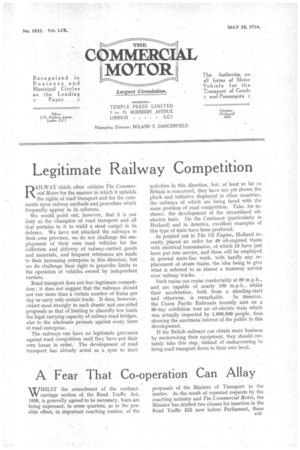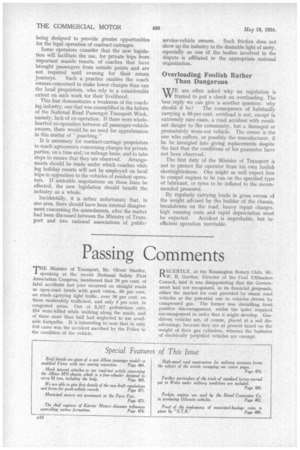A Fear That Co-operation Can Allay W HILST the amendment of
Page 25

Page 26

If you've noticed an error in this article please click here to report it so we can fix it.
the contractcarriage section of the Road Traffic Act, 1930, is generally agreed to be necessary, fears are being expressed, in some quarters, as to the possible effect, in important coaching centres, of the proposals of the Minister of Transport in the matter. As the result of repeated requests by the coaching industry and The Commercial Motor, the Minister has drafted two clauses for insertion in the Road Traffic Bill now before Parliament, these being designed to provide greater opportunities for the legal operation of contract carriages.
Some operators consider that the new legislation will facilitate the use, for private trips from important seaside resorts, of coaches that have brought passengers from outside points and are not required until evening for their return journeys. Such a practice enables the coach owners concerned to make lower charges than can the local proprietors, who rely to a considerable extent on such work for their livelihood.
This fear demonstrates a weakness of the coaching industry, one that was exemplified in the failure of the National Road Passenger Transport Week, namely, lack of co-operation. If there were wholehearted co-operation between all passenger-vehicle owners, there would be no need for apprehension in this matter of " poaching."
It is necessary for contract-carriage proprietors to reach agreements concerning charges for private parties, on a time and/or mileage basis, and to take steps to ensure that they are observed. Arrangements should be made under which coaches visiting holiday resorts will not be employed on local trips in opposition to the vehicles of resident operators. If amicable negotiations on these lines be effected, the new legislation should benefit the industry as a whole.
Incidentally, it is rather unfortunate that, in one area, there should have been internal disagreement concerning the amendments, after the matter had been discussed between the Ministry of Transport and two national associations of public service-vehicle owners. Such friction does not show up the industry in the desirable light of unity, especially as one of the bodies involved in the dispute is affiliated to the appropriate national organization.
Overloading Foolish Rather Than Dangerous ,
wE are often asked why no regulation is framed to put a check on overloading. The best reply we can give is another question : why should it be? The consequence of habitually carrying a 50-per-cent. overload is not, except in extremely rare cases, a road accident with resultant danger to the community, but a damaged or prematurely worn-out vehicle. The owner is the one who suffers, or possibly the manufacturer, if he be inveigled into giving replacements despite the fact that the conditions of his guarantee have not been observed.
The first duty of the Minister of Transport is not to protect the operator from his own foolish shortsightedness. One might as well expect him to compel engines to be run on the specified type of lubricant, or tyres to be inflated to the recommended pressures.
By regularly carrying loads in gross excess of the weight advised by the builder of the chassis, breakdowns on the road, heavy repair charges, high running costs and rapid depreciation must be expected. Accident is improbable, but inefficient operation inevitable.




















































































